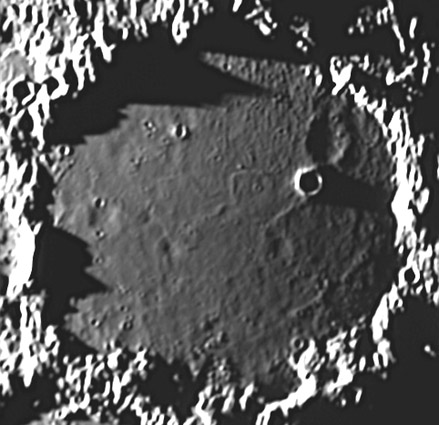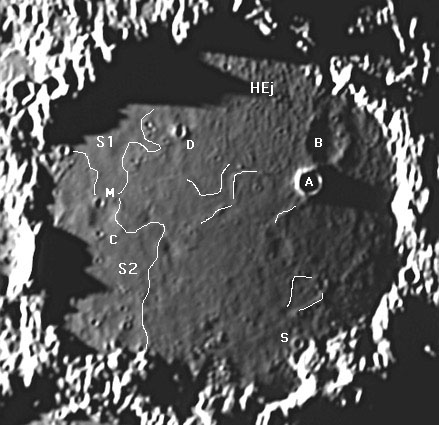August 12, 2015
Ptolemy's Strange Floor
Originally published August 12, 2004
Image Credit: Jim Phillips |
|
Ptolemy's Strange Floor The floor of Ptolemaeus is famous for its shallow depressions called saucers. But this extremely low sun and high resolution view shows that the floor has a lot more features than have been generally reported. The two biggest craters on the floor are the fresh, 10 km wide Ptolemaeus A (Ammonius) and Ptolemaeus B, a saucer. The northern portion of the floor has ejecta debris from Herschel (HEj on mouseover). The rest of the floor seems to have two or three regions with different surface roughness. The most smooth material (S1) occurs along the NW edge of the floor - the white line marks its extent. The western edge of the floor is not as smooth as S1 but is less textured than the rest of the floor - I've labeled it S2. Some ridges - traced with short white lines - are just south of Ptolemaeus A and to the west of it. Another set of ridges are north of the crater S. Lunar Orbiter IV images do not show most of these low features but do reveal that definitely S1, and maybe S2, have a lower number of small superposed craters. This implies that the smooth areas are younger than the rest of the floor. The generally accepted interpretation is that the fill within Ptolemaeus is pulverized, perhaps fluidized, ejecta from the Imbrium-forming impact. This interpretation is weakened if the floor has different age units. The ridges west of the crater A are reminiscent of lava flow levees, and with only a little imagination it could be speculated that remnants of smooth material still exist at the end of the levees. This speculation says that the interior includes individual flow units of a lava-like material, emplaced after any Imbrium ejecta, and perhaps later than the debris from the Eratosthenian age crater Herschel. This is all pretty exciting! Technical Details: Related Links: Yesterday's LPOD: CLA Tomorrow's LPOD: Double Valentine |
Author & Editor: |
COMMENTS?
Register, Log in, and join in the comments.





